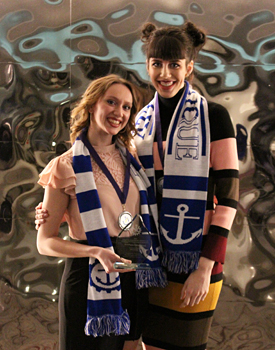Last month, third-year engineering students Annika Benson (Electrical) and Kayleigh Landers (Mechanical) went face to face with Canada’s top engineering students, and brought home a silver medal for their innovative and cost-saving solutions.
They were amongst the 10 Dalhousie delegates who, after placing first and second in the regional competition, were flown to Waterloo to compete against the nation’s best and brightest in the annual, Canadian Engineering Competition.
 The pair competed in the Re-Engineering category, which challenges students to generate feasible, creative and environmentally-conscious solutions to real-life engineering problems. In the week leading up to the competition, Annika and Kayleigh were asked to design a way to divert fabric waste from Canadian landfills, which they would later present to a panel of judges.
The pair competed in the Re-Engineering category, which challenges students to generate feasible, creative and environmentally-conscious solutions to real-life engineering problems. In the week leading up to the competition, Annika and Kayleigh were asked to design a way to divert fabric waste from Canadian landfills, which they would later present to a panel of judges.
The Dalhousie team proposed adding textile waste to current curbside pickup, and using the collected scraps as a strengthening agent for pavement — a solution deemed innovative and economically attractive, as it would essentially be free to implement.
Once in Waterloo, teams were given limited time to solve a second case: re-engineering a Kenyan elementary school to be electrically self-sufficient. In the span of eight hours, the Dalhousie pair designed a cost-efficient solar panel system, which they showed could charge classroom technology and power indoor lighting to improve education and maximize use of the facility. The creativity, feasibility and level of technical detail conveyed in the Dalhousie team’s solutions stood out from the competition, fetching them a second-place trophy and a national title.
Regional success
Benson and Landers were not the only Dalhousie students to earn a place at this year’s national competition. At the Atlantic Engineering Competition held here in Halifax this January, three other Dal teams distinguished themselves as the top talent in the Maritimes in the areas of innovation, communication and debate.
In the Innovative Design, category Dalhousie’s Laura Brenton (fourth-year industrial), Ingy Elokda (second-year Mechanical), Ahmad Kammonah (first-year Mechanical) and Yogan Parianen (third-year Mechanical) presented a novel design concept, which proved that hair might be the best way of solving some of today’s harrier environmental problem. Known as the “Oily Otters”, the team proposed using pantyhose stuffed with waste human hair as a means of absorbing marine oil spills. They implemented this idea with an autonomous cleaning robot known as the “Hairoomba”, which, unlike traditional oil sorbents was entirely reusable.
In addition to celebrating innovation and creativity, the Canadian Engineering Competition also recognizes the importance being able articulate engineering concepts to relevant stakeholders. For the Engineering Communications category, fourth-year students Faisal Hajib (Mechanical) and Essa Nimer (Civil) were asked to present a complex, technical topic in a way that would be comprehensive for the general public and where then judged on the quality of their delivery. They chose to explain the multifaceted issue of mercury contamination, focusing on the use of accessible language, and intuitive explanations to express the importance of problem to a less-informed audience.
In the Extemporaneous Debate division, Cecil Ash (fourth-year Industrial) and David Cejpa (fourth-year Industrial) demonstrated their skills pertaining, to a different, but equally valuable aspect of engineering communications. They were given a matter of minutes to structure powerful arguments on subjects ranging from whether current global climate change policies are justified to whether or not Engineering Co-op should be mandatory. For each round, a winner was chosen based on which team had the most convincing argument, strongest points, and greatest display of mental prowess.
Even greater than Dal’s representation at the competition is the valuable, hands-on engineering experience gained by the student delegates. Practice with problem solving, innovating, communicating and debating will benefit them academically and serve as distinguishing assets as they transition into industry — ensuring grads will be ready to solve big challenges in the future.

